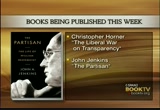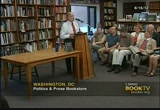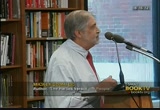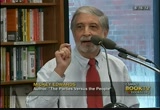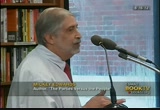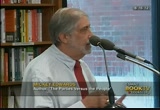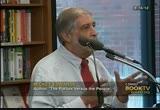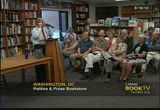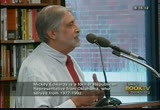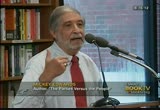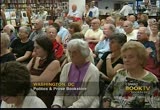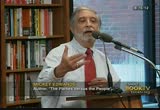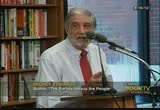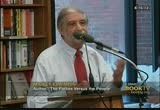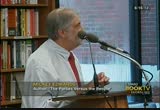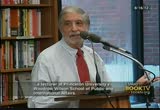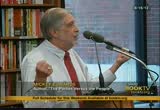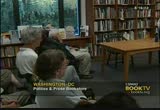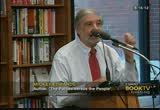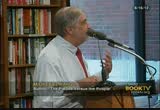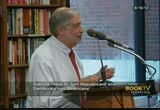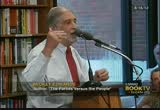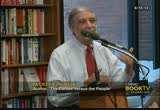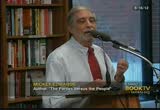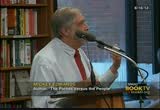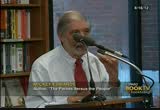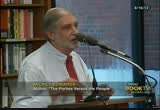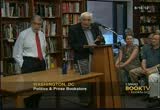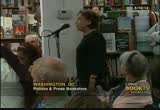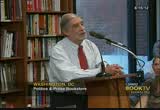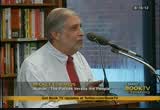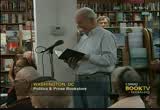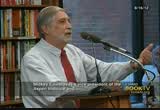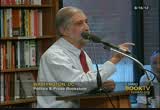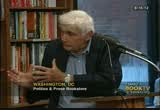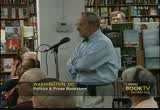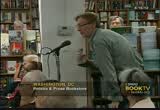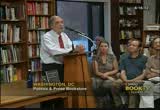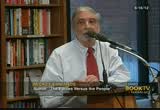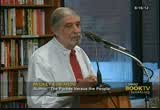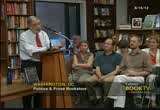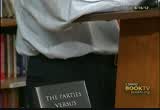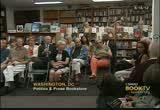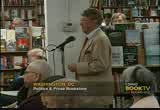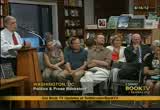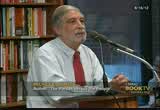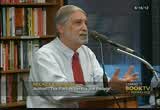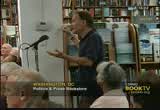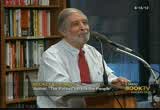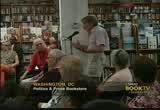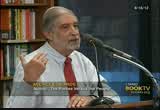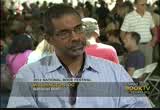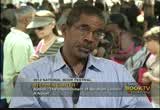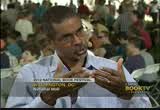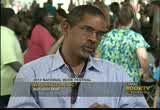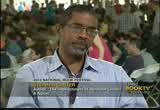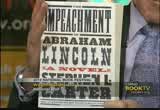tv Book TV CSPAN September 30, 2012 11:00am-12:00pm EDT
11:00 am
partisan, the life of william and were impressed. in islam, the arab awakening, he provides the rise of the arab spring and what the future holds for countries and blogs. you can watch on booktv.org. be sure to look for these titles in bookstores in the coming weeks on booktv and on booktv.org. >> former congressman mickey edwards argues that a america's political parties have obtained too much power. he says that the parties have disenfranchised voters by promoting partisanship and discouraging debate. this is just a little under one hour. >> this is going to be very
11:01 am
hard. after i left congress, i became a teacher and i taught at harvard for 11 years and i taught and those of you who are teachers know, you don't stand still and think, how did i do this? i would usually walk down the aisle, people on the side site when i talk to the ones on that site, but you know, i'll have to do, have to do it this way. >> thank you very much for coming. i really appreciate the chance to talk about my book and my ideas, what led me to write this, it is something that has been on my mind for a very long time, yet, kind of skipping quickly and coming back, as we are talking about how depressing it is and is there any way out and i want to tell you that there is a way out and we can
11:02 am
change the system, there are ways to change the system, but it's going to take fundamental changes. grassroots changes that are going to take the political system and turn it upside down. let me give you some examples of what i mean. by the way, who's going to do that? you are going to do that. change will happen. it began to dawn on me years ago. when i was in congress, i have a habit of having lot of town meetings, neighborhood meetings, meeting with constituents like this. and i might have half a dozen people there. i might have 200 people there. and he would engage about the issues that were in front of congress and what you were thinking. at one of those meetings, and
11:03 am
actually in the book, the acknowledgments, i did not dedicated to this person that i could have. but i acknowledge this to that person and somebody stood up in my town meetings anyone know why they do not do this or that. someone who wants wants to know why they do not do this. i don't even remember what it was. but i did what politicians do. i said well, i tried. i introduced a bill. that the other party controlled congress. the other party decided whether or not you could get bills brought forward. they decided whether or not and the other party did it and somebody stood up in that room and said, i am sick and tired of hearing democrats this, republicans that, and everybody
11:04 am
stood up and cheered and i never did it again. later, when i went off and i started teaching, the one thing -- it's not that you get potomac fever when you are in washington or charles river's fever when you are in cambridge , but you have to say, why is this not working? developing in congress, it doesn't matter what the issue is. it doesn't matter what the issue is. it doesn't matter whether it is a tax bill, a spending bill, a supreme court nomination, whatever it is. there is going to be a vote, and every democrat is going to be on one side and every public and will be on the other side. it's like we have two separate congresses. not a united states congress, but a very republican congress and fighting for it advantage in
11:05 am
fighting to win the next election. that did not happen by accident. it did not happen by accident. i believe in the free enterprise system and i believe in incentives. they work. we have created a political system in which every incentive is to not cooperate and not compromise and not talk to somebody who has different ideas than your own. and you know, that's great. it's great to be pure on your principal. but we are a nation of 310 million people. and we have all different backgrounds and we have all different life experiences and we have different ideas that we feel strongly about. the way a democracy the size has to work. no matter how deeply you feel about one issue or another, at some point, you have to be able to sit down with someone who has
11:06 am
a different idea and find where the overlap is, find where you can give a little and get a little and get the bridges built. and get the programs that a constitutional program that government is responsible for and make them happy. so let me tell you how we have created this. by the way, just so you don't think that i am making all this up about how bad the political party system is, the first four presidents of the united states, those of you who study history, sometimes they didn't even like each other that much. but they all agree on one thing. what did washington, adams, jefferson, and madison all agree on? do not be political parties. they said did not create political parties.
11:07 am
they had parties, obviously. some of you are historians. somebody is going to save they had political partisan, but they are nothing like the parties that we have now. they have political parties where they came together on three or four or five issues, and that was that. on other issues, i might agree with you one day, i would oppose you the next day, that is the way it was. but not anymore. when george w. bush was president and the president was issuing presidential signing statements, which i thought he was saying he did not have to obey the law, but what happened was, there was a legitimate, strong argument being made by the president's supporters in favor of why the president had the use statements to distance himself from legislation. there were also very strong arguments by people like me who
11:08 am
says that that is unconstitutional. the american bar association appointed a task force to look into these findings and i was a member of that task force, and then the president of the aba and i testified before a house committee and, guess what? even though a good face was being made for the president to issue and sign the statements, not one single democrat, not one saw any merit in his argument. even though i thought and a lot of other people thought that what the president was doing was clearly unconstitutional, the president saying i don't have to obey the law that i just time, not one republican done anything wrong with it. on issue after issue, foreign policy or anything else, we divide into these parties. first of all, there is nothing
11:09 am
in the constitution that creates political parties and nothing that creates political primaries and allows political parties and party bosses and legislatures to talk congressional district lines. let me talk a little bit about that. because by identifying what the problem is, you can see where the solution is. and i do believe that our solutions are there. very quickly, let me talk about the primary system. you know, a lot of you in this room, there are a lot of you i don't know, but i know something about everybody in this room. you all believe that when you go to the store and you buy a cell phone, when you buy a book, you want choice. that is what we are. we want choice and things that we get and did things that we think and do things that we
11:10 am
really want choice is for. the only place where we have devised a system to stifle choice is in selecting the people who are going to decide whether to go to war, when our taxes are going to be, what programs we are going to create. because under the push of the party, -- let me get to that in a second. but because of the push of the parties come almost every state in the united states has what they call sward loser loss. it is that if you run in your party's primary and you lose, you cannot be in the ballot on november. you are prevented from being part of that. i'm going to give you a couple of brief examples. some you will be thinking about what happened to dick lugar in
11:11 am
indiana. just to show you the numbers, in delaware, where there is a million people -- 1 million people in delaware, and i don't care whether you would have been for mike castle or christians or christine o'donnell, that does not matter to me. what matters to me is in a state of a million people, chris o'donnell got 3000 -- i'm not good at math -- but it seems like a small percentage, 30,000 votes. because she did not, mike castle, whom she beat, who is a longtime congressman and he would have been the overwhelming choice of the people to be there was not even allowed to be on the ballot. in utah, 3 million people, 3500 went to a convention and in that convention, because they chose to not we nominate senator bennet, he could not be on the ballot in november.
11:12 am
so what happens is, and this is true and 46 of the 50 states. the great bulk of the voters, when they go to the polls to choose who they want in congress, why in the world we allow these private clubs to tell us that you can only vote a or b. why do we let them tell us that you can only consider the person you might have chosen to be your senator. that is what we have dealt with. the party primary system created by law, by the party, not the result of anything in the constitution. let me give you another example. redistricting. let me tell you about gerrymandering. there is a provision in the constitution that every single representative and senator must be an inhabitant of the state in
11:13 am
which they are elected. the idea is very simple. i'm supposed to know you and your interests and concerns so i can articulate them. well, what happens when the parties control what the district lines look like and they draw the lines for party advance, i will give you one example, and this is very embarrassing for me tonight. i am a city gentleman. i am a complete city gentleman. groceries come from the grocery store and whoever heard of a font? i represented oklahoma city, a big city. they read to my district the middle of oklahoma all the way up to the kansas line, half halfway across to arkansas and a big upside down letter l. here is what happened.
11:14 am
for years, this is what is embarrassing. i said look at what they did for me. they didn't do it to me at all. you are supposed to know them and they are supposed to know you. i was a city guy representing wheat farmers and cattle ranchers and merchants and i could not articulate well enough what was of importance importance to them, not happen. by the way, in the next adjoining district, a pool guy was representing a part of the city. because it worked for party advantage. we allow for that to happen. there is is a way to get around that, too. there are other kinds of things that we can get into with questions about money. here's a story in "the new york times" was completely wrong in the headlines. it was about the fact that super pacs are pushing parties out of the way.
11:15 am
and they were doing the funding and parties were not relevant. that is nonsense. did you ever look to see who is running this? okay, let me skip over that. let me go to what happens when you are in congress. you know, i have a former congressman here who has lived through it, as i have. here is the deal. there is a kumbaya moment. you when you're sworn in, there you are with dick gephardt and al gore, we are members of the same united states congress, that last for about 30 seconds. as soon as you are you're done, you vote on who will be speaker. you vote on what will be the party rules and what committees will have how many of his party
11:16 am
in that party and you divide straight along party lines. you go to a committee meeting, and it is like as a republican, another embarrassing moment -- how many of you have actually been to the house floor or observe the house floor? >> here is an interesting thing. i am speaking to you. some of you are over here, some of you are over here. here is a lectern. i can barely see over it, but there is a lectern. one left turn for me to talk to all of you. there are two lecterns in house. the first time i spoke, i'm so for myself. i thought that i am going to be so persuasive, but i'm going to talk to the democrats or the republicans. and i'm going to look at them and they are going to hear me and they are going to buy my argument. so i went and stood at the
11:17 am
lectern in front of the democrats and there was this cast. it is kind of like you're going to get cooties if you touch the wrong left turn. but if you look at the house, what you have is easy to separate lecterns and use separate computers to look things up. if i wanted to go get a cup of soup or read a newspaper or make a phone call, what you do in the cloak room, the republicans go to one cloakroom and the democrats go to another cloakroom, you can't even have soup together. and we have created that system. there are ways to fix this. but what we have created is a system where people don't know each other as friends or colleagues or allies. they are republican or democrat. because if i cooperate with you, and there are close party primaries where only the
11:18 am
activist vote, by cooperating and compromising, i am going to lose my seat. that is the incentive system. when you allow them who is going to be on the ballot, what you have done is give the activist in the most hyper partisan and hyper zealous and hyper ideological, the ability to keep you off the ballot if you stray and are not pure enough. this is happening in both parties as well. okay, how do you get past all this? let me wrap it up by trying to say that it is awful, right? do we have to live with it? no, we do not have to live with it. 40% of americans today declare themselves independents. people wondered how scott brown one in massachusetts. i lived there and i talk there. there are such things as democrats in massachusetts, but there are more enrolled
11:19 am
independent voters. over 40% of voters. usa today said that people are fleeing from the political parties, they don't want to be tied to this political party. they don't want to give situation where you have a congress, where if you want to be on the committee, sir, i do not know you, but let me assume that you are a whiz at math and you know finance and economics and you want to be on the ways and means committee. everything fits. i would say to you if i was one of the party leaders. you know, i am willing to put you on the committee. you can make good laws, but you have to promise before we give you that committee position that you are going to stick with the party line on the these things. you haven't even heard a hearing and you haven't seen the bills, but you have to promise that you're going to stick to the party. that is the way that it works.
11:20 am
here are some of my recommendations, proposals, in 2006, the people of washington state had had it. and they went to the polls because four states had initiative petitions. the voters themselves could get signatures and put things on the ballots and change the laws that are wrong. the people at washington said we are going to do away with close party primaries. we are going to say that if you are a qualified candidate where every state has certain rules to qualify, if you are qualified, you're going to be on the ballot, whether you are a democrat, republican, green party, libertarian, whatever it is -- all of you who are qualified are going to be on one ballot and every single registered voter is going to get to vote among all those people. then if you have abramoff if nobody gets over 50%, you have a
11:21 am
run off. what comes out of that? let's look at the case of sherman and berman in california. two liberal democrats. this was a district that a liberal was going to win. no longer can either of them get elected in the general by just appealing to people who share their ideology. they have to appeal to all of the voters in the district. republicans, democrats, liberals, conservatives, moderates, but have to be a representative of the people of that district and not a small subset of the district. california did back in 2010. they did away with that in 2010 and other states can do that as well. i think that every state needs to do that and take away from these private clubs. that is all that they are.
11:22 am
private clubs, take away their power to keep you off the ballot and keep you as a voter from having full range of choices that are available. okay, redistricting. thirteen states now, california did it, washington did it, they said to heck with this. we will not let party leaders draw congressional districts to suit them. what we are going to do is create redistricting commissions. thirteen states have argued on that now. guess what happens? in california, when the power to draw district lines is taken away from the parties, and you had to run in a district that encompasses people from both parties -- in this election, this time, 12 members of the california delegation, one fourth of the california delegation retired.
11:23 am
rather than run in a fair and open election that everybody had a shot in. you need to re-change the district and, you need to re-change the primary system and let me just leave over and tell you that the internal workings of congress -- in this book, i have a chapter called rearranging the furniture. imagine, for a moment that you and your beloved other rocketing along. you are having fights. things are tough. and so you went to a shrink. and the shrink says, i will tell you what. let's set this up so that you have to separate couches facing away from each other. you each have your own tv sets in the way we are going to deal with it is that you don't talk to each other. you know, what you need to do is rearrange the congress internally to break that down
11:24 am
and we went from highly partisan republican speakers to a highly artisan democratic speaker to a highly partisan republican speaker, because do not blame them. speakers of the house believe it is their job to be their party leader. in great britain, they don't think it's their job to be a party leader. in canada, the speaker is not partisan. did you know, and this may shock you, but the speaker of the house does not even need to be a member of congress? >> you don't have to pick one of your partisans to be the leader, leading you in the congress towards a political war. you could have a congress that
11:25 am
works together and says let's consider all the good legislation and have it out and have serious debates together so that we think that as americans, not as republicans or democrats, that as americans, -- john and i were on appropriations together. why are their partisan issues? job is to get data and call witnesses are dead what you have partisan shaping us. why do you have leaders getting to choose who gets to sit on what committee in exchange for promising to go along with the party lines? why do we allow that to happen? well, the first part is the easy part. you can change the laws about primaries and you can change the laws about redistricting.
11:26 am
in order to change the internal workings and the rules of congress, who can be the speaker, who and how a speaker can act. the only way to do it is to do what you are all doing tonight. when you are a congressman or senator or state legislature, show up at a meeting, be there and demand that they change. so many members of congress, the number of members of congress who vote with their party 95% of the time. if you build your party 95% of the time, you're not voting with your brain. you are not voting with your constituents. you are voting with your party. it is up to us to make the change. the revolution has already begun, people are sick and tired of it, and that is why this book
11:27 am
is called -- i love the title, i came up with "the parties versus the people." it is a war by the parties against the interest of the people for their own advantage. the part that i really love is how to did turn democrats and republicans into americans. it was a year ago in the atlantic came up with that. and i thought, you know, it is set pretty well. i will stop there and take questions on whatever. [applause] >> thank you, this was a great presentation and a great start. what i would like to hope that we get is some of your ideas on how to make things work. beyond the redistrict the one
11:28 am
thing that i have learned about districting in his travels from east to west. washington, california, etc. places such as colorado and iowa have had these commissions, too, and have created competitions in elections. why don't we began, and if you are comfortable, please say your name as well. it makes the town meeting good. >> yes, great to have a town meeting. >> i am doctor caroline and i am a physician and a democrat. and i think some of the things you are suggesting would help. but i don't think it is the same thing as one side is on the other. when i was in the federal government, ronald reagan was president and reagan said the
11:29 am
government is not the solution. government is the problem. and he thought it was very funny to say oh, i'm from government and i'm here to help you. that was a good laugh line at a republican meeting. i think the democrats, despite what is going on, have stretched out their plans, barack obama agrees that there would be no taxes in the new budget, just spending cuts. the house democrats and house republicans would not accept that. so i don't think it's the same on both sides, and i think you ought to suggest them also in oklahoma. [laughter] >> i do suggest them in oklahoma and everywhere, all over the country. i think people are going to have different ideas about which party is worse than where they came from. certainly, you mentioned obama's
11:30 am
outreach, and i think he did find an outreach. when he did, nancy pelosi said no, we won the election. it is kind of you know, it's kind of hard. some people are saying totally outrageous and nasty things. what we have to do is break it down where people like that can sit down together and say, what is good for the country and not how i can score political points. ..
11:31 am
so, i agree with you. i think we need to get past that. we need to get past government is a problem in some areas. government is the solution in seven areas. >> thank you. >> at evening, steve. >> and steve hammock in the chair of constitution project. and you have two ideas in here which i want to talk about because they both appear to me to be unconstitutional. last night the first is that you say we should allow campaign constitutions only from a candidate whose constituents, nobody else. >> i didn't quite say that, but go ahead.
11:32 am
>> actually give me a copy of this chat there. and then you say we would be well served by a broad mandate and that for purposes of campaign contributions, the term persons refers only to actual individual living human beings, no corporate money, no union money, no money from political action committees, no money from political parties. political campaigns should be paid for by people and only people. how do you overcome the constitutional infirmities in both of those ideas? >> we do have to say that he's the chairman of the board of the constitution project commission is the president and i'm on the board. but steve, i had an exchange today with trevor potter, former head of the federal election committee and as a bad out, that
11:33 am
i think that you could have law that says only human beings can go. i think you could frame it but only living human beings can cast a vote, can contribute, which the court says is equivalent to voting. i do not think that there should be campaign contributions, as you said, from corporations. the idea the corporation is a person is -- what a idea. [applause] first of all -- i will tell you the supreme court justices said that they know, law, but they don't know corporate law because corporate type definition have powers they would not have. i do what corporate money come a union money, i do want super pack money. i know what political party money. i won a system that is
11:34 am
transparent, open and on the individuals contributing to political campaigns and i think we can do constitutionally. [applause] >> will go onto the next question. >> and i speaking too loudly? >> that's not an issue. i just want to comment because this is part of the stimulating debate were having. some years ago when i was head of common cause on promoting imagine a system of campaign contributions, tom foley, the speaker for a while and the nonpartisan speaker by any definition of the word. we came up with an idea that when you have matching contributions and if a person were to take matching contributions, you could condition meant that a substantial portion of the contribution should come from within the state, that the candidate resides in. so that was an effort at trying
11:35 am
to balance the thrust of what mickey edwards is saying and is a way of perhaps handling the constitutional infirmity question and is a thing to think about as we try to fix the campaign system and move away from corporations being people. thanks for the indulgence. >> you didn't know going into the lions den, i used to consult for freeman kerry. my patients are my best patients at bethesda, so it was an experience to come out to the congress periodically. the ugliness of what is going on is the racism that it's gotten out of control. yesterday's example of biden carrying on about unchanging. the only difference between unchanging and unshackling is that these people from prince to 10 small shackle.
11:36 am
but the real base for barack obama is minority america. the weaknesses he can't deliver. i have a pet demon that is lots of people have asked about mitt romney's background, what he did ack chapping of hair. welcome michelle obama was the director university of chicago medical center and she's been left alone about what she's accomplished in taking care of people with limited resources, limited incomes and that's extremely important, especially since health care is a huge issue at the present time. >> both sides. >> hi there, charles smith. let me try and frame my question. i mean, you are proposing a number of structural changes, which i hope would make a difference. just assuming for a second they did come in the question i have is in a democracy, essentially the median voter makes the difference. so changing any of these laws in
11:37 am
terms of voting, in terms of primaries regardless, ultimately it's going to be changing the median voter. and there is a lot of evidence, like you say with your example of the commission on the defense, a nevada social finance says he simply living to two different universes. so it strikes me that change anything really fundamentally means we have to change attitudes. sabato says that. my question is that one issue that i see is fox news, which is essentially a 24 propaganda machine. i'm curious about your views in terms of what is the influence of fox news on the attitudes and the dialogue in this country, and how is that an asset or barrier to change or barrier to change or barrier to change that's a good question. i will broaden it a little bit i've seen fox and msnbc, neither
11:38 am
one does a lot of good for the country. i suggest now most people in here probably anti-violence, right? i hesitate to say this, but i thought we could actually solve a lot of our nations problems if we took rush limbaugh and keith olbermann and put them in the same bag and drop them off the bridge. so i do think various problems on both sides. but if i can expand a little bit -- that was a good question and one of the worst things you can do if you just authored a book and you want people to buy the book is 10 minutes to extort and suggested that in other books they had to buy, and i don't know. one of them i'm sure still here, but john hiatt spoke, the righteous mind, about people learning to understand where other people are coming from is a terrific book in about the came out with my last book did,
11:39 am
i guess about four years ago by bill bishop from texas who wrote a book called the big sort, which identified the fact that americans today in large numbers. not everybody obviously, in large numbers only tax you people who think the way they do. they hang out with people who read the same columns, watched the same tv shows and so forth. and so, the question -- you can laugh, that's your point about attitude, you're right. it's not just the people who get elected, it is us. we have to learn to be one country. we have to learn to respect each other, even if somebody sues are different from my own. i sent congress i frequently lost, but i still had good friend on the other side you voted differently than i did. the site differently differently than i did.
11:40 am
so you know, you're right. i think your point about attitude is very, very important. >> hayek, although i agree with much of what you say, there is a problem, not with what you are saying, but we have to be cautious that we don't just rearrange the deck chairs on the titanic. many of our problems, both national and international has layer upon layer upon layer of causes. one brief example, we may be on the point were geographic representation is the only representation. it may not be sufficient to have all of our representations geographically based. okay, so what i want to know is
11:41 am
where are we going to really get a dialogue with the people, national and international, to start to pick apart what is happening to us, what our goals are both near-term and long-term and how we are going to overcome the great forces against us, i.e. the past, corporations and many case the government itself could look at my times the people have to fight the government to get what it is they want. so i don't know how we're going to get there and i don't know whether you'll have an other, but how when we do this we are appealing to the very same organizations and systems that are holding us down. do we expect them to reform sufficient? i don't know the answer. >> is a very good question. first of all, i agree with the basic premise of what you're saying. and with each you said.
11:42 am
this is a much broader question in my book doesn't really deal with all of it. but we've got a lot of other problems. for exmple, when you talk about, as i did, touring keith olbermann and rush limbaugh overboard, well, the stations on which they appear are owned by people on the networks are owned by people who are raking in big bucks while poisoning the well. our public schools whose students do not teach critical teaching entre thinking. they don't teach civics. i mean, we're big changes we have to make as a society. maybe that's another book. but i've started on it actually. but this one is, you're absolutely right. and to your final point, that is why i made the argument that at some point it's up to all of you when your congressman shows up
11:43 am
for your state legislature, you have to be there and you have to demand their behavior. they're not going to change it on their own. people are afraid. i'll tell you one -- i hope he doesn't mind me quoting him. he just lost his election yesterday. cliff stearns from florida, even though you can tell this by looking, i spent time in the house jim and talk to members and a lot of them are very frustrated by the pressure, you know, not to cooperate, not to be collegial and some of them lose their careers. so we have got to create support. we've got to change the incentive system and support those people who are willing to say we're one country, let's find a way to work together.
11:44 am
>> l. tucker, i worked in the white house counsel's office during the making of this tradition. there is a lot of merida much you have to say it pours, but i don't know how you change the system. you know, the parties -- anyone can create a party. ross perot had his party, but he didn't have enough interest in him to get elected. and so, at first you have to have someone is that's going to create enough interest to rival the democrat and republican party. and i don't see that happening. that's going to take a lot of money, and a lot of organization and an individual that can rally people around him because the independents -- to talk about the independents actually having more people than the republicans and democrats, which is true. but they are split in 100 different ways also. so there's no movement except
11:45 am
the two parties in our country that can cause enough people to coalesce around them to have an effect and elected candidate. >> yeah, i'm not trying to supplant the two parties we have with another one. i mean, the two parties we have are bad enough. who needs more? so when i am in favor of this taking away from those parties -- i'm just going to put democracy back into democracy. i am trying to allow the people that have the full range of choices about who they want. so i don't care whether it is a republican, a democrat, reformed party, whatever it is i don't care. let the people choose which one will best represent them. i'm not trying to get rid of the parties. i'm trying to take away their control over the system. >> one other comment. i was at a dinner and problems
11:46 am
and after hubbell was elected and his brother happened to be sitting at the table and i was telling them his brother needs to form a party. he said he won't do that because he wants to be for any party for democracy. >> at the good fortune of getting russell hobble and i thought it was a very good statement by him, absolutely. >> hayek, i like a lot of people, this is the first election i liked about him. a lot of people in the age group don't have the education or the desire to spend all their time watching cnn or reading any of the multiple newspapers that there are to get information about the election. so what they get their information from is the mudslinging commercials that are out now by super packs and even
11:47 am
the politicians like obama last night who said this isn't a mudslinging campaign, even though we can't change the super subs are right now, how do we change from mudslinging to actual information about the politicians will do if they are elected versus just killing other people's campaigns. >> you know it's funny -- [applause] your reform is hard because one way we tried to stop that, the nastiness was by requiring candidates to appear themselves and say i am alex and i approve this message. so now they go on and approve the message that is mudslinging. so you know, that doesn't help. you know, first of all i'm sorry that young people don't want to read more sources and get our information, but a friend of
11:48 am
mine named steve who taught at m.i.t. now teaches at harvard were to talk about negative campaigning may be 10 years ago, 12 years ago and his conclusion, sadly for him and for my story is that a works. i don't know an answer, but i will say that i share your feeling. this particular campaign has been very light on serious vision. you know, it has been mostly used when talking about how terrible the other one is. and that's not just congressional. i think the american people would like to have some -- trust us. we're smart. talk to a seriously about where you want to go with what you want to do. i don't know how to change that except if you find someone to negative, just as i do not them.
11:49 am
if they realize negative campaigning doesn't work, maybe they'll change because political consultants want to win elections and if they find out strategies to work, maybe those change. >> thank you. this'll be our last question. >> yeah, you stress the great political divide between the parties, but what about these corporations that play both sides, by lavishing huge contribution on members of both parties against federal favors at the fda, destroying good system but these genetically modified products that crept into the country without any vetting, that are releasing these drugs that are questionable, clamping down on whistleblowers at the fda and other agencies. and the revolving door between former politicians who take positions that corporations and vice versa. many people switched back and forth remark times.
11:50 am
what kind of chance do we stand when we have this fundamental foundation? >> you know, i think we have to change but we reward them what we don't reward. some people it said to me that i'm very candid and very blunt and that is because i'm not in congress anyway. i think john will say this is the way it was when i was in congress. so serious an example about how you change the reward system. you talk about people on both sides. so when i was running, there was a banker in oklahoma, which was not in my district, who contributed to my campaign. i was very happy. wow, that was great. turns out that because it's publicly reported, i later read in the paper he'd also given to my opponents campaign. and so, i asked him about it and he said, well, i am really for
11:51 am
you, but i want you to make sure that whoever won i would urge. and i said, i want and you are remembered. so that's basically what you have to do. you have to just tell people that if they play the game and away you don't like, they're going to lose your support. >> this will be the last question. >> you must have some power over him. >> i was in the restaurant. i didn't hear the cut off. >> good for you. >> should i retire? i heard it mentioned about the representation system that itself could be proved that one idea is to a constitutional amendment to divorce the senate from states so that each senator
11:52 am
would represent 3.1 million people at the present time. the boundaries to be drawn by the federal election commission, which should be bipartisan and so you wouldn't have the party interference and you would no longer have wyoming and alaska, which of two senators unless population and the district of columbia. [inaudible conversations] >> cannot come without getting into specifics of any of these changes, let me say i'm glad you made that point because my whole book is about reopening the question about what kind of a political system we have. we have one that doesn't work yet i think it's because we've allowed political parties to dominate the elections and redistrict gene. and the way we do things in congress. so since you're going to get a last word, let me end with this. the point of my book is not to be known.
11:53 am
i've never wanted to spend my life bemoaning about how things are. so my layout what exactly are the systems that we've allowed to grow up that are having this effect on our system, that reward instability, that punish compromise and cooperation. and so, kind of like in the spirit of what she said, i am saying we need to turn the system upside down. but i think it will happen. i think it is starting to have been. you know, maybe you're right things to move from west to east. i think the american people have had it with the kind of system that takes impossible to govern a single united states of america and we're going to change it. klotzbachng [applause] th >> live is stephen carter and he
11:54 am
is the there among many other books of this one, his most recent, "the impeachment of abraham lincoln: a novel." pfizerth carter, there are twohc primary theme here that i want to get to that are historicallym inaccurate. number one, abraham lincoln survived the assassination of abraham lincoln is impeached. where did you come up with thism >> i should start by making thehalfat in spite of title, i am a lincoln fan. this is not an argument onhment, behalf of lincoln's impeachment. it is just a novel. and for me as a lincoln fan oftd in them and interested in thes a presidential power and history,d it is a question that suggests itself. what if lincoln had survived ana what of him as telling his political enemies company had any come including his own 1865y party, which we tend to forget, as late as 1865, are looking for
11:55 am
a way to get the amount of ther? way. what if they do the impeachment process? mysteraroundama/murder courtroom did it occur to you it's a fun thing to do? >> guest: i don't know. i remember back in college, history major, undergraduate, and shadowing after class one day what if lincoln survived? over the years, people speculated about that, it's in the history books as well, but the story, where the assassination fails i should say, i don't know when it came to me. once it came to me, i had to write it. >> host: now, you're a law professor at yale as well; correct? >> guest: yea >> host: the courtroom drama part, did that come easy to you? >> guest: well, i don't know, for me, no novel's refuel easy to write, but it is true, this fit into the interests of the scholar. i write about presidential power and war power and lincoln over the years, and so taking those
11:56 am
questions, those ideas, putting them to fiction, if you think about it, lincoln did things in the civil war that raised interesting questions like extend the writ of habeas corpus, luck up journalists critical of the war and rejected the military's court marshall. my notion was what if the impeachment process be used for political reasons, nevertheless dredge up things done in the war as a way to get him out of the way. >> now, from a historically accurate point of view, how much political pressure was abraham lincoln under in early 1865? >> you know, lincoln was thee most talented politician, i believe, who ever inhabited -- well, not the oval office, but the presidential office at the time. he had to balance competing factions of his own party. he had to run the civil war while trying to maintain his own presidency. all throughout the presidency, there were other members of the
11:57 am
party who put it simply, better men than he, better morally and other ways, and ought to hold the job instead. as late as march 1865, lincoln's political foes are still trying to figure out a way to reduce his power, somehow take charge of the administration because they viewed lincoln as a man who just shouldn't be wielding the power he was. >> another thing i want to get out before we -- before you leave us, who is his attorney? who defends him? >> there's a lot of novels about lincoln told from the point of view of an insider, someone in the white house, someone of power. i wanted to tell the stories from the eyes of an outsider so the protagonist is a young black woman named abigail cantor, 21 years old, and shemented to be a lawyer at a time when there was no female lawyers in america, only seven lawyers overall, and
11:58 am
she ended up with a job as a minor clerk at the law firm that defended lincoln in the novel. i wanted an outsider's perspective to look at lincoln through the eyes of someone who was black and yet outside the court orders of power and figging hard to get in. >> his corically accurate, six or seven black lawyers in america in 1865? >> historically accurate. there's no full members of the bar, i have to be careful, in the late 1870s. they did legal duties, but the small number of black lawyers was interesting. at the time, there was not money to be made. there were black lawyers, black doctors, and what's overlooked, one of the most admired and plausible professions in the 1860s was being a pharmacist. being a pharmacist was lucrative
11:59 am
and republicked more than a doctor, for example, and there was a handful of black pharmacists as well. >> host: stephen, homing books have you -- how many books have you written? >> i think i published eight or nine non-fiction books, losing track, and this is the fifth novel. i just like writing. >> host: are you teaching this semester at yale? >> i'm still a full time law professor. since i started writing novels, most of which sold well, people asked if i would stop teaching. i love being a law professor. that's my job. writing novels is a kind of hobby. it's something i do to get a break from the other things that i do, and as long as people keep reading them, i'll do that too. >> when you first wrote your novel, why? what got you over the first hump? >> i always had characters floating in the head whose stories i wanted to tell as though they were crying out in there to let them out, and even today when i write a novel,
206 Views
IN COLLECTIONS
CSPAN2 Television Archive
Television Archive  Television Archive News Search Service
Television Archive News Search Service 
Uploaded by TV Archive on

 Live Music Archive
Live Music Archive Librivox Free Audio
Librivox Free Audio Metropolitan Museum
Metropolitan Museum Cleveland Museum of Art
Cleveland Museum of Art Internet Arcade
Internet Arcade Console Living Room
Console Living Room Books to Borrow
Books to Borrow Open Library
Open Library TV News
TV News Understanding 9/11
Understanding 9/11